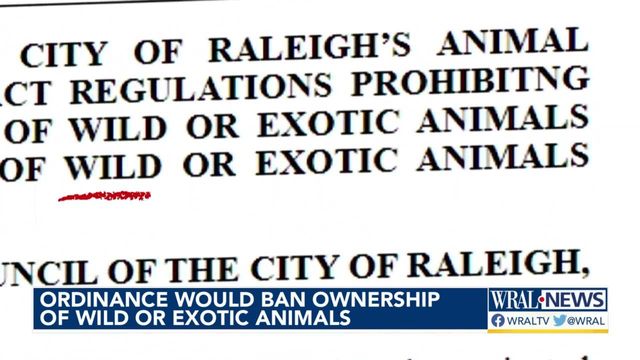Owning monkeys, snakes, squirrels and other wild animals could be prohibited under proposed Raleigh ordinance
The first draft of a proposed ordinance banning wild and exotic animals as household pets has been sent to Raleigh City Council to review. The ordinance is in response to a venomous zebra cobra that escaped from a home in north Raleigh.
The cobra was captured on a porch on Sandringham Drive using a glue trap on June 30, after police were alerted about the snake on June 28. Police later said that the snake had actually been on the loose since November.
Criminal summons were issued against the snake's owner, Christopher Michael Gifford, 21, alleging he violated state regulation regarding the ownership of venomous reptiles.
The 40 charges involved are misdemeanors. Thirty-six of the misdemeanors are for keeping various venomous snakes in plastic containers without any locks. Three others involved mislabeling the containers for certain snakes.
The supplies to capture the snake cost Raleigh police just $60, but manpower to track and catch it added up to $8,177.92. The department spent an additional $1,300 in gas.
Now, the Raleigh City Council will hold a public hearing on the proposed ordinance on Aug. 17.
If approved, it would require owners to get exotic animals out of the city within 90 days.
Councilman David Knight requested the city attorney draft the proposed ordinance, which would ban someone from possessing or harboring wild or exotic animals, including monkeys, lions, tigers, alligators, coyotes, ducks, squirrels and deer.
North Carolina is one of only six states that don't ban private ownership of venomous snakes or require a permit to have them. But owners must follow specific regulations, including housing them in secure enclosures with warning signs and notifying authorities whenever one escapes.
"All other cities of any size in North Carolina have an ordinance on dangerous and exotic animals, and that's what we are trying to move to," said Knight.
The ordinance would also make it illegal to feed those animals, with an exception for bird feeders that are at least 5 feet off the ground. People who intentionally leave trash that attracts wildlife could also face a fine up to $100.
Raleigh-based animal law attorney Calley Gerber said the ordinance, as it's written now, needs some clarification.
"I think enforcement could be a real challenge," added Gerber. "Will it apply to people who have snakes that are nonvenomous? Can you be fined for feeding the squirrel in your front yard some nuts? According to the ordinance, you can. That’s all of a sudden going to be a crime."
There's also challenges with enforcing the ordinance, according to Gerber.
"Who do you go after, [and] who do you salary to go around looking for incidents? Is this just complaint driven, or do we actually have a unit that's just going to be out enforcing?" Gerber said.
She added that there's loopholes in the ordinance that "need to close to protect folks."
"It looks like it still needs a little work. I understand what they're trying to do with it, but I have some concerns about some of the language in it," said Gerber.
Ron Sutherland, with the nonprofit Wildlands Network, said he worries an ordinance could criminalize interactions with nature.
“You wouldn’t want everyone to think they can’t bring a garter snake home to keep as a pet for a few days ... to make that a misdemeanor crime in the city of Raleigh," said Sutherland.
State lawmakers have also drafted a bill that would prohibit the possession of non-native snakes. Under the bill, current owners would be grandfathered in but would have to register their snakes with the state and carry $1 million in liability insurance.
Legislative leaders say that proposal won’t get a vote this year, and the two Wake County lawmakers drafting it said they plan to introduce it during next year's legislative session.












